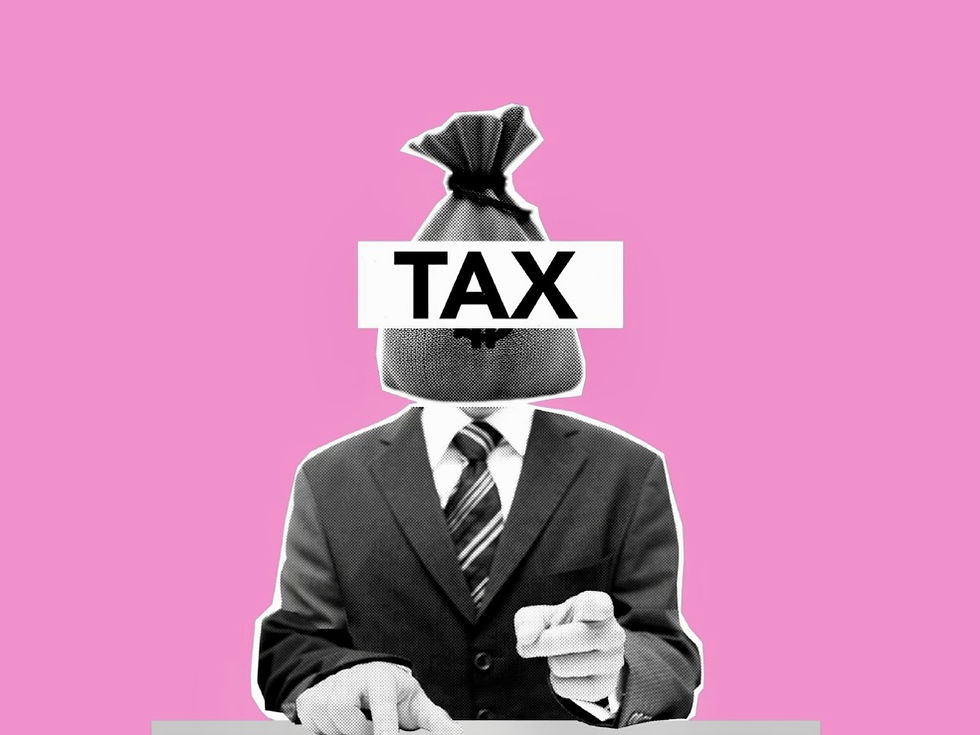What Trump’s ‘Big, Beautiful Tax Bill’ Actually Means for You
- jennysmithmattfeldt

- Jun 4
- 4 min read
What it means for your paycheck, your taxes, and your future—even if you don’t follow politics.
By Jenny Smith Mattfeldt | Published June 4, 2025

Odds are at this point you’ve heard about Trump’s “One Big Beautiful Bill.”
It’s a tax and spending package that recently (and narrowly) passed the House in a 215–214 vote and is now headed to the Senate floor. If you’re anything like me, even looking at it feels overwhelming. The terminology is basically a foreign language, and while I know it’s going to affect me… how, exactly? Let’s break this thing down into something actually digestible and figure out what kind of impact this bill could have on your life.
To understand what’s really going on, let’s start with what’s inside the bill. Here are the biggest pieces—and how they could hit your bank account, paycheck, or day-to-day life:
The Bullet Points
Tax Policy Changes
Permanent Extension of 2017 Tax Cuts
New Tax Exemptions: tip income, overtime pay, social security benefits, & more
Spending Adjustments
Allocates $150 billion to increase military spending, including $25 billion for the proposed "Golden Dome" missile defense system
Provides $350 billion for border security enhancements, including $50 billion for border wall construction and $4 billion for Border Patrol expansion
Social Programs
Imposes work requirements for able-bodied adults without dependents receiving Medicaid
Cuts funding for programs like Medicaid, food stamps, and green energy initiatives
Eliminates funding for the Department of Education, Department of Housing and Urban Development (HUD), and the Environmental Protection Agency
Fiscal Impact
Deficit Increase: The Congressional Budget Office (CBO) estimates the bill would add approximately $2.4 trillion to the national debt over the next decade
Debt Ceiling: Raises the national debt ceiling by $4 trillion to accommodate the increased spending and tax cuts

Tax Cuts for Individuals and Families
The bill proposes lowering income tax rates for most brackets, meaning a lot of Americans could see more take-home pay. It also proposes making the 2017 Trump tax cuts permanent, which were previously set to expire at the end of 2025. These include a nearly doubled standard deduction, lower marginal tax rates, and a higher exemption for the alternative minimum tax (AMT).
On top of that, the bill introduces several new tax exemptions:
Tip income would become tax-free
Overtime pay would be exempt from federal income tax
Social Security benefits would no longer be taxed
Car loan interest would become a new deductible expense
What this could mean for you: Slightly bigger paychecks, more money from tips and overtime staying in your pocket, and a few extra write-offs—especially if you’re a wage worker or benefit from Social Security.
The permanent extension of the 2017 terms means keeping some of the biggest tax breaks in recent history. The standard deduction—essentially the portion of your income you don’t have to pay taxes on which you can see below—was nearly doubled under the 2017 tax law. Making this permanent would continue to simplify filing for many taxpayers.

Business & Corporate Tax Benefits
The bill also includes expanded deductions for small businesses and lower taxes for corporations. The idea is that cutting business taxes will stimulate job growth, encourage companies to build their products in America, and raise wages—but economists are split on whether that really plays out for everyday workers. The bill maintains the permanent 21% corporate tax rate and expands deductions for small businesses, including immediate write-offs on equipment and increased business expense deductions.
What this could mean for you: If you’re a freelancer or business owner, you'll see benefits right away. If you work for a big company, don’t expect an automatic raise.
Increased Spending on Military, Border Security, and Infrastructure
The package includes a big boost in military and border spending, with estimates placing defense budget increases in the tens of billions. Border security would see enhanced surveillance and infrastructure, and projects like highways and energy updates are promised but not yet fully itemized.
What this could mean for you: While these sectors may see job creation—especially in construction, defense, and government contracting—there is still the question of how all the advancements would be paid for.

Plan for Paying It All Off
One of the biggest concerns is the bill is expensive, like billions of dollars expensive. Supporters say it will "pay for itself" through economic growth, but critics argue that’s wishful thinking. Elon Musk recently called it a "disgusting abomination" due to the long term fiscal implications. If the math doesn’t work out, the financial burden could shift to future taxpayers—aka us.
What this could mean for you: Short-term gain, long-term question mark. It will feel good now, but someone eventually has to pick up the tab.
What About the Tariffs
While not explicitly laid out in this bill, there’s growing talk around using tariffs—particularly on imports—as a way to generate federal revenue and reduce our reliance on internal income taxes. Basically, we would pay less income tax and the country would still be making money from external sources. Trump has floated the idea of a 10% universal tariff on all imported goods, along with higher, targeted tariffs on certain countries like China. The idea here is to bring manufacturing back to the U.S., strengthen domestic industries, and redirect financial power back to the people.
What this could mean for you: In theory, this could ease the individual tax burden over time. Instead of being taxed on your income, the U.S. would generate revenue from goods entering the country—encouraging domestic production and potentially creating more jobs stateside. Yes, it could mean slightly higher prices initially but it’s also a long-game play at U.S. self-reliance and economic independence.
In short, this part of the conversation is still developing but it's a signal that the policies may be shifting back to an America first mindset. And that's something worth working for.





Comments